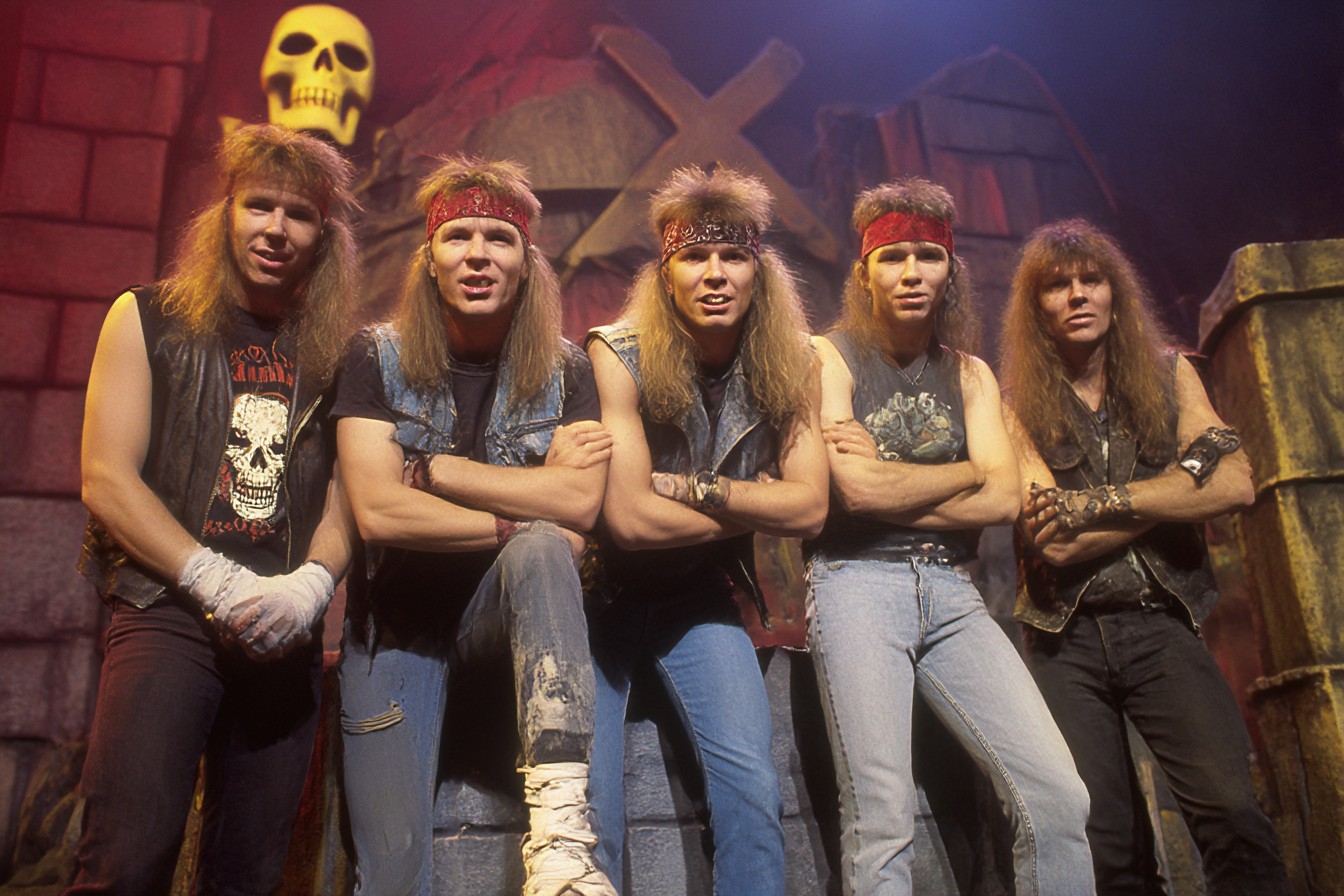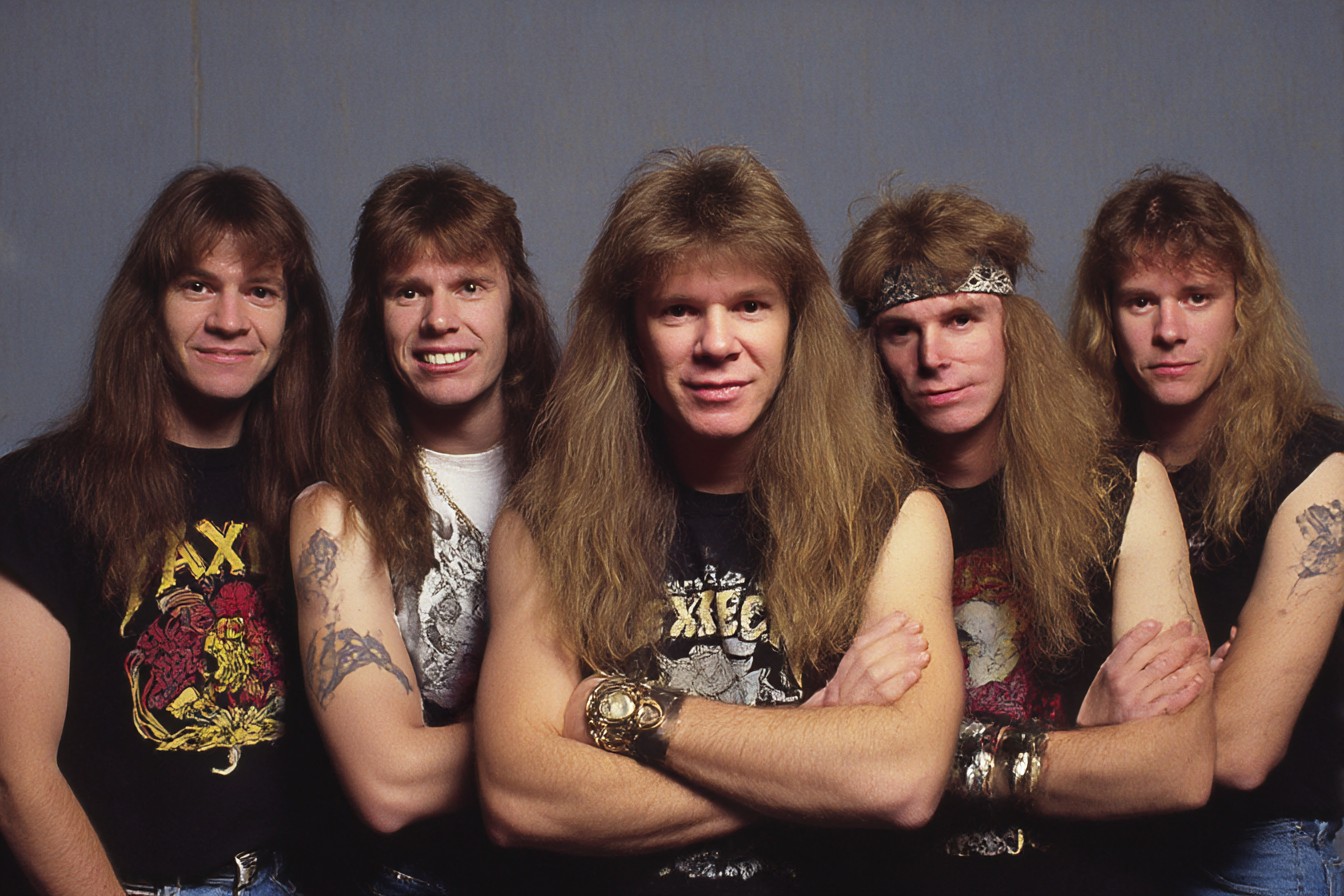I need to start with a confession that’s going to undermine about 70% of my credibility as a metal journalist: I own five—yes, FIVE—different Iron Maiden t-shirts that I rotate through my wardrobe with embarrassing regularity for a man in his fifties. My current apartment has an entire wall that my last girlfriend referred to as “The Shrine”—a meticulous display of Maiden vinyl, backstage passes, and a framed concert poster from the Seventh Son tour that cost me more than my first car. I once got into a bar argument with a guy who claimed “Somewhere in Time” was overrated, and friends had to physically restrain me from turning it into the least metal fistfight in history. And yes, I was absolutely that insufferable know-it-all who repeatedly, emphatically declared to anyone unfortunate enough to be within earshot that “Iron Maiden cannot fail. It’s literally impossible.”
Which brings us, painfully but inevitably, to “The X Factor.”
October 2nd, 1995. I remember the date because it was my buddy Derek’s birthday, and we’d planned to pick up the new Maiden album and immediately dissect it over beers at his place. I’d been cautiously optimistic about the Blaze Bayley era. Sure, Bruce Dickinson leaving in ’93 had been a gut punch to every Maiden fan on the planet, but I’d convinced myself this could work. Blaze had been solid in Wolfsbane, had the right kind of growly-yet-melodic voice, and hey—Maiden had survived singer changes before, right? They’d be fine. Maiden was Maiden. Steve Harris wouldn’t let us down.
The guy at the record store—Tower Records on Sunset, where I spent roughly 40% of my disposable income throughout most of the ’90s—actually gave me a weird look when I bought it. “Let me know what you think,” he said with this expression I couldn’t quite read at the time but now recognize as pity.
Two hours and three beers later, Derek and I sat in silence in his living room. The last notes of “The Unbeliever” had faded out maybe five minutes earlier, but neither of us had spoken or even moved to lift the needle. Finally, he just looked at me and said, “What the hell was that?” I had no answer. For possibly the first time in my adult life, I was left speechless by an Iron Maiden album—and not in the good way.
“The X Factor” wasn’t just disappointing; it was disorienting, like walking into your childhood home to find all the furniture rearranged and painted in colors you don’t recognize. The songs were long—really long—but without the epic payoffs of something like “Rime of the Ancient Mariner.” The production was muddy and oddly compressed, lacking the dynamic punch that had always been a Maiden trademark. And poor Blaze, man. It wasn’t even that he was bad; it was that the songs seemed written for a completely different vocal range than what he could comfortably deliver.
The opening track, “Sign of the Cross,” actually started promisingly enough. That monastic chanting intro created atmosphere, and when the band kicked in after the extended intro, there was a moment of “OK, here we go!” But then… we didn’t go. The song meandered for over 11 minutes, with sections that felt repetitive rather than hypnotic. By the time Blaze started singing, I was already checking my watch, which is not something I’d ever done during a Maiden song before.
“Lord of the Flies” had a decent groove and was one of the few tracks where Blaze seemed comfortable, but the chorus felt oddly restrained when it should have soared. “Man on the Edge”—probably the album’s high point and eventual single—had energy but lacked the memorable guitar harmonies that defined the band’s classic material. By the time we hit “Fortunes of War,” with its seemingly endless intro, Derek had already gotten up twice to check if the CD was skipping or if the song was actually that repetitive. (It was the latter.)
Look, I know I’m being harsh here, but this is coming from a place of love. The kind of profound disappointment you can only feel when something you care deeply about lets you down. The kind of letdown made worse because I’d been so vocally, insufferably certain that Maiden was immune to the kind of missteps that had befallen other metal bands of the era.
What went wrong? It’s easy to pin it all on Bruce’s departure, but that’s overly simplistic. This was the mid-90s—possibly the most hostile environment for traditional heavy metal in the genre’s history. Grunge had demolished hair metal. Nu-metal was starting its rise. Even thrash was struggling to maintain relevance. The metal landscape had shifted seismically, and many of the giants of the 80s were either radically changing their sound (Metallica) or becoming legacy acts playing increasingly smaller venues.
But beyond the external factors, something had clearly shifted within the Maiden camp itself. Steve Harris had always been the band’s primary songwriter and driving force, but “The X Factor” felt like Harris had taken even more control, crafting songs that indulged his progressive tendencies without the counterbalance that Adrian Smith (who’d left earlier) and Bruce had previously provided. The resulting album was—and I say this with genuine pain—often boring, a word I’d never associated with Iron Maiden before.
The production didn’t help matters. The album sounds oddly flat, with Nicko McBrain’s usually thunderous drums pushed back in the mix and the signature guitar harmonies feeling less distinct. Even the artwork—marking a departure from the Derek Riggs illustrations that had defined their visual identity—felt like a statement that this was a different Maiden. And not necessarily in a good way.
As for Blaze himself—I’ve grown more sympathetic to his position over the years. The poor guy was put in an impossible situation, handed material that didn’t play to his strengths, and then sent out to face audiences who were pre-disposed to resent him simply for not being Bruce Dickinson. I caught the tour supporting this album at the Hollywood Palladium, and the atmosphere was… weird. The crowd response to the new material was polite at best, but when they played the classics, the energy level doubled—while simultaneously highlighting the awkward fit of Blaze trying to sing songs tailored to Bruce’s operatic range.
The concert was actually my turning point toward a more nuanced view of “The X Factor.” Watching Blaze give it his absolute all despite the mixed reception, seeing Steve Harris still playing with his trademark intensity even for these new, less-loved songs—it reminded me that bands aren’t static entities. They evolve, sometimes stumble, occasionally fail. And yes, even Iron Maiden could fail.
I ran into Dave Murray years later at a guitar show in Anaheim. I was there covering it for a magazine, and he was checking out some vintage Strats. I worked up the courage to say hello and mentioned I’d been a fan since “Killers.” We chatted briefly about guitars, and then, because I apparently have no filter when nervous, I asked him about “The X Factor” era. I expected a defensive response or a quick subject change, but instead, he just said, “Tough time for the band, tough time for metal. We were trying to find our way forward. Some things work, some don’t, but you have to keep moving.” There was no bitterness, just the perspective of a musician who’d been through enough career highs and lows to take both in stride.
Time has been interesting to “The X Factor.” It’s still not regarded as a classic Maiden album by any stretch, but there’s been a small but vocal reassessment among some fans who appreciate it for what it is rather than criticizing it for what it’s not. Songs like “Blood on the World’s Hands” and “The Aftermath” have aged better than I initially thought they would, revealing layers that weren’t apparent on those first disappointed listens.
For me personally, the album has transformed from an active disappointment to a fascinating document of a band in transition. It’s Iron Maiden’s “Creatures of the Night” or “Turbo”—the album where a legendary band momentarily lost the thread of what made them special while searching for a path forward in changing times. And just as those albums have found their defenders over time, “The X Factor” has its champions (though they remain a distinct minority among the Maiden faithful).
I still pull out my vinyl copy about once a year, usually late at night after a few drinks when I’m doing one of those chronological discography deep-dives that my neighbors just love. And while it still strikes me as the clear low point in the band’s catalog, I’ve developed a strange appreciation for its ambition, if not its execution. There’s something almost admirable about a band refusing to play it safe or simply rehash past glories, even if the results don’t quite work.
The ultimate vindication, of course, came in 1999 when Bruce returned to the fold (along with Adrian Smith), and Maiden reclaimed their place in metal’s upper echelon with “Brave New World.” That album felt like reuniting with an old friend after years apart, finding that despite some new wrinkles and gray hairs, the essential connection remained undiminished.
So yes, I was wrong. Iron Maiden could fail. They did fail. “The X Factor” was the moment when even their most ardent defenders (like yours truly) had to confront the band’s fallibility. But you know what? There’s something almost comforting in that recognition. It makes their subsequent renaissance all the more satisfying, a reminder that even legends stumble, but the great ones find their feet again.
I’ve still got those five Maiden t-shirts in regular rotation. “The Shrine” still dominates my living room wall. But these days, when someone at a show or a record store engages me in one of those passionate metal debates that I live for, I’m a little less absolute in my pronouncements. Because if Iron Maiden taught me anything, it’s that even the most seemingly immutable forces in metal can have their X Factors—those moments of uncertainty when the future looks unclear and the magic seems temporarily out of reach.
Though I did eventually win that bar argument about “Somewhere in Time,” for the record. That album is a masterpiece and I’ll fight anyone who says otherwise. Some things never change.





Leave a Reply